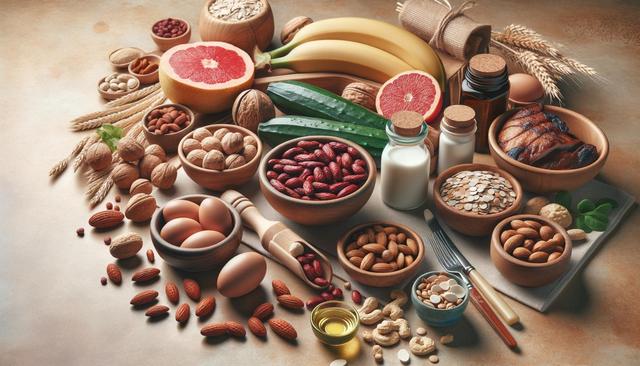Nourishing Hormones Naturally: Foods That May Support Men’s Hormonal Health
Discover key foods for men’s hormonal health in our guide. Learn about the best foods for male testosterone production, including zinc-rich options and healthy fats. Support your vitality and balance hormones naturally through informed dietary choices. Always consult a healthcare professional for personalized advice.

Understanding Hormones and Nutritional Influence
Hormones play a critical role in regulating many aspects of men’s health, from muscle development and energy levels to mood and reproductive function. Among these hormones, testosterone is often central to discussions about male hormonal balance. While aging and lifestyle factors naturally influence testosterone levels, diet can also have a significant impact. Certain nutrients are involved in hormone production and regulation, and incorporating them into daily meals may support overall endocrine function. A well-rounded dietary approach focuses not just on boosting testosterone, but also on supporting organs like the liver and thyroid, which are integral to hormonal balance.
Nutrition doesn’t act in isolation, and the synergy of multiple food components often offers the most benefits. For example, foods rich in antioxidants help reduce oxidative stress, which otherwise can impair hormone production. Understanding the connection between diet and hormones is a step toward making informed choices that benefit long-term wellness. Whether it’s through micronutrients like zinc or macronutrients such as healthy fats, each element plays a role in the hormonal puzzle.
Zinc-Rich Foods for Hormonal Support
Zinc is one of the most well-recognized minerals associated with testosterone and male reproductive health. This essential nutrient supports the function of enzymes involved in hormone production and helps maintain a healthy immune system. A deficiency in zinc has been linked to reduced testosterone levels, making it important to include zinc-rich foods regularly in the diet.
Some foods high in zinc include:
- Pumpkin seeds
- Chickpeas
- Cashews
- Lentils
- Quinoa
In addition to dietary sources, it’s important to consider how other lifestyle habits affect zinc absorption. For instance, excessive alcohol consumption and chronic stress can deplete zinc levels, making dietary intake even more crucial. Including a variety of these plant-based zinc sources can help support daily needs and contribute to optimal hormonal function.
Healthy Fats and Testosterone Production
Fat often gets a bad reputation, but certain types of fat are essential for hormone production, including testosterone. Cholesterol, for example, is a precursor to all steroid hormones. Including healthy fats in your diet can support the production of these hormones naturally. The goal is to focus on unsaturated fats and avoid trans fats or excessive saturated fat intake.
Key sources of healthy fats include:
- Avocados
- Olive oil
- Chia seeds
- Almonds
- Fatty fish like mackerel or sardines
These fats not only support hormone synthesis but also reduce inflammation and promote cardiovascular health, which is important for overall vitality. When consumed in moderation and as part of a diverse diet, healthy fats help maintain energy levels, aid in nutrient absorption, and contribute to a balanced hormonal profile.
Cruciferous Vegetables and Estrogen Balance
While testosterone is often the focus of men’s hormonal health, maintaining a healthy balance between testosterone and estrogen is also important. Cruciferous vegetables like broccoli, cauliflower, and Brussels sprouts contain compounds that support the metabolism of estrogen, helping maintain hormonal equilibrium. One such compound, indole-3-carbinol, has been studied for its potential to support estrogen balance and detoxification pathways in the body.
Adding these vegetables to meals can be beneficial in multiple ways:
- They are high in fiber, supporting gut health
- They contain antioxidants that combat oxidative stress
- They offer anti-inflammatory benefits
Including cruciferous vegetables a few times a week is a simple and effective way to aid in hormonal balance. Whether steamed, roasted, or added to smoothies, these foods offer an accessible path to better health through diet.
Vitamin D and Hormonal Function
Vitamin D functions more like a hormone than a vitamin in the body and plays a key role in testosterone production. Low levels of vitamin D have been linked to lower testosterone levels in several studies. While the body can synthesize vitamin D from sunlight, many people do not get adequate sun exposure due to lifestyle or geographic location.
Vitamin D-rich foods include:
- Mushrooms exposed to UV light
- Egg yolks
- Fortified plant milks
- Fortified cereals
Supplementation may be necessary for those with confirmed deficiencies, but incorporating these foods into the diet can support overall vitamin D status. Since vitamin D also aids in calcium absorption and immune function, it contributes to multiple aspects of well-being beyond hormonal health. Regular blood tests can help monitor levels and guide dietary or supplemental needs.